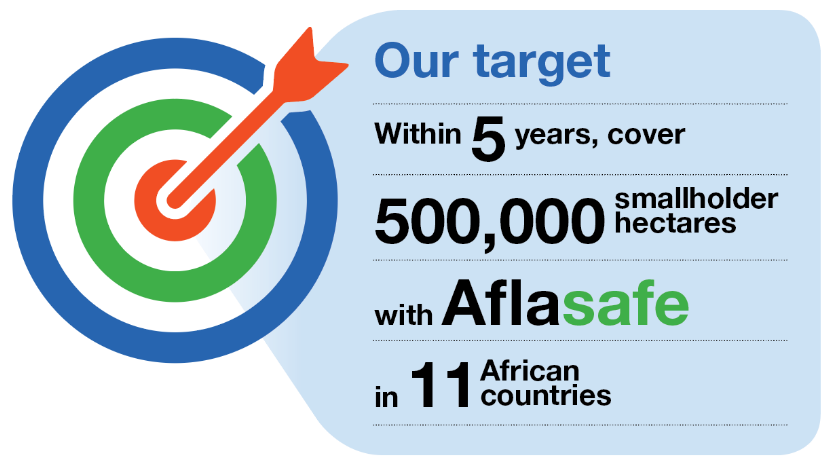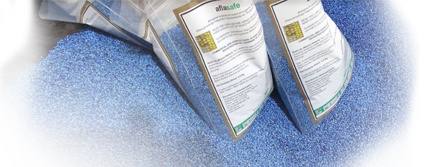DES MOINES, IOWA, USA, 19th October 2017 – If we have a powerful and effective research-proven solution to a chronic global problem, potentially affecting us all through the food we eat, how do we best ensure that solution reaches those that most need it in the real world?
We answer that question, as Aflasafe steps firmly onto the world stage today at a panel discussion during the 2017 Borlaug Dialogue International Symposium. The event is held in conjunction with the presentation of the World Food Prize. Join us – virtually or in-person – as we trace the track trodden by the Aflasafe Technology Transfer and Commercialisation Project (ATTC). We’ll ‘unpackage’ that abbreviation and examine ATTC’s dynamic design, how project partners work together to build successful public–private partnerships, and progress on goals.
 “There are many great technologies being developed by research organisations, but we must change our thinking on how to get them to market,” says Mr Abdou Konlambigue, ATTC Managing Director. “We are realising that there is a vibrant private sector in Africa ready – and eager for opportunities – to play their due role.”
“There are many great technologies being developed by research organisations, but we must change our thinking on how to get them to market,” says Mr Abdou Konlambigue, ATTC Managing Director. “We are realising that there is a vibrant private sector in Africa ready – and eager for opportunities – to play their due role.”
The Borlaug Dialogue is a prestigious event that brings together the luminaries of the food world. Attendees come from diverse disciplines – ranging from politics to science, and from funding to farming. This year’s theme is The Road out of Poverty, harnessing the power of approaching agriculture as a business.
“There is a tremendous momentum, with everyone across different organisations talking about agricultural transformation rather than agricultural development” says Mr Konlambigue. “We are seizing the moment and actively engaging in that discussion at both the global and Africa level.”
ATTC is implemented by the International Institute of Tropical Agriculture (IITA) in collaboration with Chemonics International and Dalberg Global Development Advisors, with support from the Bill & Melinda Gates Foundation, the United States Agency for International Development (USAID), and the CGIAR Research Program on Agriculture for Nutrition and Health. Representatives from most of these organisations will be on the panel. The project aims to commercialise Aflasafe by helping make the business case for sustainable private-sector systems for Aflasafe’s production and distribution. Cutting aflatoxin contamination in maize and groundnuts by between 80 and 100%, Aflasafe has the potential not only to avert chronic health disasters but also to create prosperity for millions of African farmers and entrepreneurs in the agriculture and food industries. In Nigeria alone, the negative economic and monetised health impact of aflatoxin in 2014 was a staggering USD 985 million (1.2% of total GDP).
“A great product is not enough,” explains Dr Ranajit Bandyopadhyay, Principal Scientist (Plant Pathology) and Research Leader of the Africa-wide Aflasafe Initiative at IITA. Together with Dr Peter Cotty of the United States Department of Agriculture – Agriculture Research Service, and in partnership with several institutions, Dr Bandyopadhyay was one of the scientists instrumental in developing Aflasafe. “The next step is sometimes even more difficult. We scientists can’t do it by ourselves. It is like a relay race: we pass on the baton to someone else with the right expertise, but we also stand by, ready to take the baton again when required. Product R&D never completely stops; IITA is committed to providing ongoing support in both R&D and commercialisation as needed over the years to come.” This support is provided for in the fees schedule of the Aflasafe technology transfer licences and agreements.
At first glance, Aflasafe is admittedly a difficult product to market, since aflatoxin contamination is invisible, and a safe harvest looks no different. Sadly, it is also true that toxic grain can easily be sold on African markets, making it difficult – if not impossible – to easily and readily trigger any economic incentive for farmers and farm businesses to invest in Aflasafe. This does not however mean that we shy away but rather that we rise up to the challenge, well aware of the terrain – and our ultimate aim.
“The key to our approach is that we are looking directly at incentives,” says Mr Mario Kerby, Director, West Africa and Haiti at Chemonics International. “We are not interested in the dependency model of giving hand-outs to farmers, because it’s not sustainable. Instead we reach them through economics, and focus on key market segments to drive early adoption. The strategy in each country is different – for example, in Nigeria the biggest demand for aflatoxin-safe maize is from the poultry industry, where its use in feed gives a clear economic advantage. They have an interest in promoting Aflasafe and they act as our anchor buyers. On the other hand, in Senegal, it is exporters who are very keen to buy groundnuts that meet the strict standards of markets like the European Union, and our partners BAMTAARE Services are investing in a production plant. In the longer term, we are also working to raise awareness amongst farmers of the health and income advantages of Aflasafe.”
These private-sector partnerships not only ensure rapid and sustainable market growth, but also offer research organisations the possibility of diversifying their income streams. “We are crossing the divide between science and business, and in the end everybody wins,” says Mr Kerby.
ATTC is like the traditional three-legged African stool, with each partner making an essential contribution to successful commercialisation. While IITA brings its research and development expertise and the Aflasafe product itself, Dalberg Global Development Advisors craft strategies for each country and Chemonics International leads the practical implementation of those strategies on the ground.
Another key aspect – in both session panellists and ATTC itself – is the inclusion of funders as an integral part of the team. “People often see funders as sitting on the other side, just providing the money,” says Mr Konlambigue. “The big change with ATTC is that we really work hand-in-hand with funders. We jointly design the approach each business case requires, they advise us through challenges and help us tap into their vast networks and on-the-ground intelligence. No one is dictating the agenda but everyone is contributing to our mutual success.”
ATTC has already surpassed its 2017 goal of 100,000 hectares of land treated with Aflasafe. Its 2020 vision is to reach half-a-million hectares in 11 countries across Africa. ATTC has formally instituted distribution and manufacturing partnerships in three countries, with more expected by the end of the year. Sustaining this progress is the tough work ahead, for which we are rolling up our sleeves and applying elbow grease, as we continue on our way along the road out of poverty.
“One of the early lessons we’ve learnt is that we have to be nimble and ready to adapt,” says Mr Kerby. “Senegal, for example, was the third country where we began the commercialisation process, but it is now the furthest ahead. There will always be unexpected challenges, but we need to be ready to seize the opportunities.”
Keep tabs on Aflasafe’s travels on its commercialisation road through our interactive map.
Panel Participants:
- Eric Reading, Executive Vice President, Chemonics International
- Abdou Konlambigue, Managing Director, ATTC, IITA
- Mario Kerby, Director, Chemonics
- Orin Hasson, Senior Program Officer, Bill & Melinda Gates Foundation
- Angela Hansen, Advisor, Dalberg Global Development Advisors
About ATTC: The Aflasafe Technology Transfer and Commercialisation Project (ATTC) implemented by IITA identifies strategic options for partnership with private companies or government entities, executes those partnerships, and helps ensure the distinct Aflasafe products reach millions of farmers. The project will contribute to improved food safety and increased income for smallholder African farmers through using Aflasafe. ATTC’s target is to cover half-a-million smallholder hectares with Aflasafe in 11 countries where Aflasafe is − or is likely to soon be − a nationally registered product. These are Nigeria, Kenya, Senegal, The Gambia, Burkina Faso, Ghana, Malawi, Mozambique, Tanzania, Uganda and Zambia. ATTC’s activities are geared to increase Aflasafe’s availability and accessibility, and to improve access to lucrative aflatoxin-conscious markets for maize and groundnuts. Download our project brochure
About Chemonics: Founded in 1975, Chemonics is an international development consulting firm. In 76 countries around the globe, our network of approximately 4,500 specialists share a simple belief: those who have the least deserve our best. We reimagine global supply chains to deliver essential medicines to the right place at the right time. We take a promising new way of powering a village in Kenya and adapt it to a village in Colombia. We embrace project management as a discipline, not an afterthought, with our ISO 9001-2015 certified Quality Management System to apply lessons learned across thousands of projects. And we deliver results. We’re one of the world’s leading partners in international development, because where Chemonics works, development works.
Contacts for more information: Media enquiries | Commercialisation | Research
Links:











One Reply to “Commercialisation catwalk: market-ready Aflasafe® hits ‘The Road out of Poverty’ on the world stage”